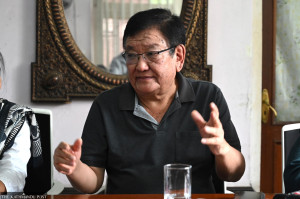National
How the government bowed down to contractors
All key demands of the contractors were addressed as the public procurement regulation was amended three times in two and a half months.
Prithvi Man Shrestha
The government conceded to almost all key demands of public builders by amending the Public Procurement Regulation three times in the last two and a half months.
When the government made the sixth amendment to the regulation on May 13, it had barred the contractors charged with irregularities by the Commission for Investigation of Abuse of Authority from taking part in public contract bids, limited the contract extension period to half of the original project deadline, and introduced a provision where construction companies could participate in public contract bids only up to the amount four times their average annual turnover of the past five years.
The amendment drew criticism from public contractors despite the Public Procurement Monitoring Office’s claim that the regulation was revised after a wide consultation among the stakeholders.
To pile pressure on the government into reversing the amendment, the agitating contractors threatened to eschew participation in all government invited construction project bids from the new fiscal year 2019-20.
The government ultimately conceded to the demands of public builders by amending the regulation twice on June 6 and August 1.
Rabi Singh, president of the Federation of Contractors’ Association of Nepal, said looking at the last two amendments, the government has addressed the key demands raised by contractors. “This is in favour of infrastructure development,” he told the Post.
As per the sixth amendment to the regulation, companies like Kalika Construction owned by former minister Bikram Pandey and Pappu Construction owned by suspended lawmaker Hari Narayan Rauniyar could not take part in any public contract bids as the two firms were facing corruption cases at the Special Court.
But the seventh amendment opened the doors for companies like Kalika and Pappu to participate in public contract bids. Instead of a blanket ban, the seventh amendment entrusted the government with the authority to decide whether to allow corruption-accused companies from participating in public contract bids.
As per the decision, the Cabinet has delegated this authority to the related ministry.
Experts say that the discretionary power given to the ministry could be misused for personal benefit.
“I don’t say every person in power will misuse this discretionary power. But it gives leeway to the minister concerned to misuse the authority for personal benefit,” Bhanu Acharya, former auditor general, told the Post.
He suspects the provision could promote bribery and corruption in the public construction sector.
Even the contractors don’t rule out such a possibility.
“Instead of giving discretionary power to the minister, it would have been better to have a clear provision in black and white,” said FCAN President Singh.
Moreover, the eighth amendment to the regulation has allowed builders to get contract extension by one year for the contracts signed before June 6.
The sixth amendment had banned extension of contract beyond half of the original project deadline, only to relax the rule with the seventh amendment that allowed the government secretary to extend contract deadline by a maximum of one year after assessing if the project in question could be completed within one year.
The rule was further relaxed with the eighth amendment, allowing the government to extend the deadline of any contract by one year, irrespective of the project’s progress status, or the reason that led to the delay, including the builder’s negligence.
Former auditor general Acharya said both the seventh and eighth amendments were bad ideas.
“The best solution would be to allow project chief to extend the deadline,” Acharya told the Post.
The government also flip-flopped on the issue of bid capacity in the last three amendments.
The seventh amendment removed the provision of sixth amendment which allowed a contractor to participate in a bid up to the amount four times of its average annual turnover in the past five years.
The removal of this provision once again paved the way for contractors to occupy multiple contracts at a single time, which many believed might have been introduced in favour of some big contractors occupying large number of contractors without completing them.
The eighth amendment corrected the provision and allowed to accept bids up to seven times the bidders’ average annual turnover in the past three fiscal years. The provision, according to Acharya, is the only praiseworthy move made by the government as it encourages competition during bidding process.




 23.12°C Kathmandu
23.12°C Kathmandu














